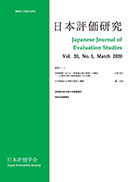
- Issue 2 Pages 1-
- Issue 1 Pages 1-
- |<
- <
- 1
- >
- >|
-
Implications from Research Ethics in PsychologyNobuyuki Kobayashi2020Volume 20Issue 1 Pages 1-14
Published: March 31, 2020
Released on J-STAGE: June 01, 2023
JOURNAL FREE ACCESSThis paper discusses respect for people, an important principle of evaluation ethics, from the viewpoint of ethical considerations for research participants in Psychology. Based on the discussion, this paper withdraws the implications for issues to be reflected in the Guidelines for the Ethical Conduct of Evaluations, which was established by the Japan Evaluation Society. As psychological research involves a higher risk than practical activities, an ethical review is required prior to research. When evaluation participants are to be exposed to a significant risk, a similar review is desirable. Thus, judgment criteria on the necessity of ethical review need to be researched. Since the Guidelines does not assume the situation that an evaluation decides assignment of intervention, informed consent in such situation and acceptable formation of control group also need to be discussed. In addition, some issues emerged from the practice of research ethics. Ethical review affected the selection of research method and researchers tended to avoid a certain type of research method. The ethical principles conflicted each other and this situation made ethical judgement difficult. As a result, the ethical considerations overburdened research participants in the case.
View full abstractDownload PDF (502K) -
Keisuke Kagami2020Volume 20Issue 1 Pages 15-26
Published: March 31, 2020
Released on J-STAGE: June 01, 2023
JOURNAL FREE ACCESSThis article presents the issues of the evaluation functions by the agencies which are a form of organization in the Japanese central government. Agencies are classified into two types. First is “implementation agency” that implements project and operational works, and second type is “planning agency” that have a function of the formulation of the program and project. Each agency implements the different evaluations.
In this article, I consider the actual evaluation of each agency. Firstly, I clarify the contents of function of each agency. Based on these functions, I propose the evaluation fitted to each agency’s function. Secondly, comparing the suitable evaluation and the actual evaluation, I derive some issue of the actual evaluation.
View full abstractDownload PDF (576K)
- |<
- <
- 1
- >
- >|